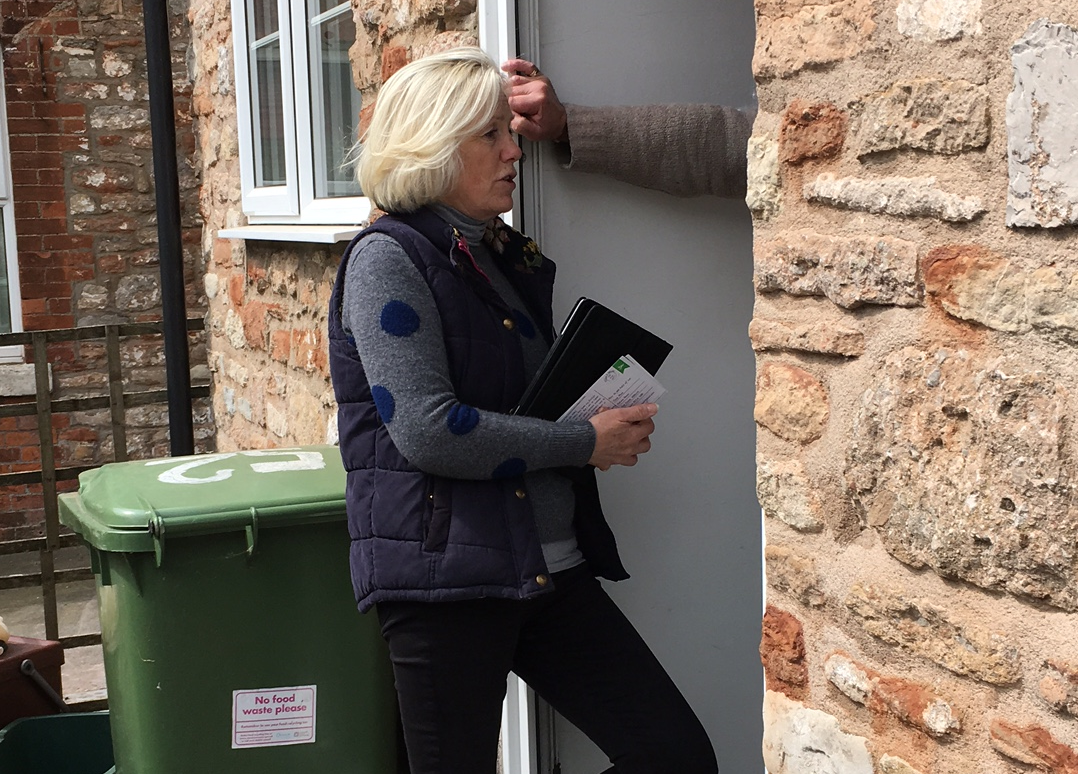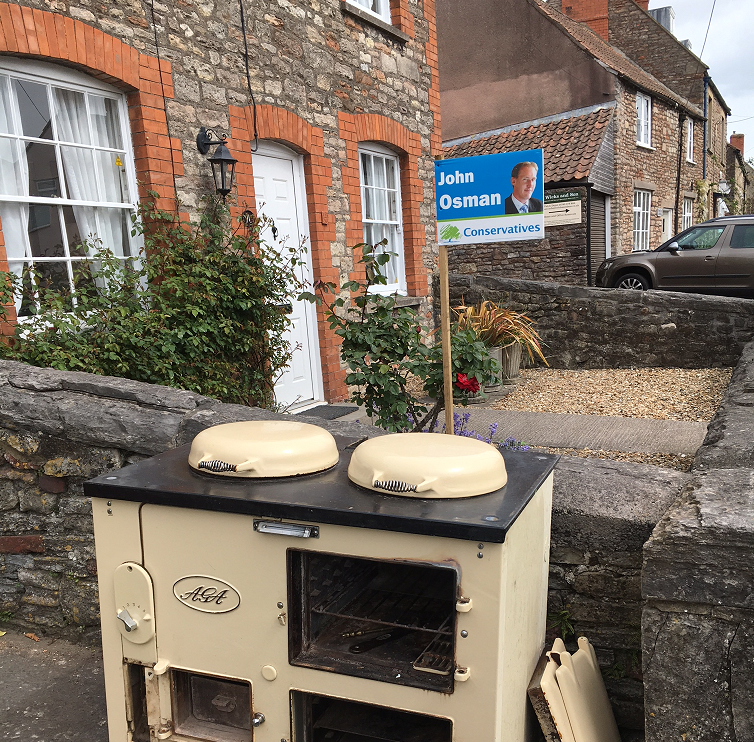Wells: The constituency that will tell us how strong the Lib Dem revival really is
The cathedral city of Wells in Somerset is a stiff test for Tim Farron’s party, which lost it two years ago and is now fighting to win it back, although it voted to leave the EU in last year’s referendum

When I caught up with Tessa Munt in a pretty terrace just off the High Street in Wells, she was talking to a church-going voter who was worried about Tim Farron’s views on gay sex. That was a news story that had cut through to some of the voters here, at least. (Further up the terrace we spoke to a pub landlord who had no idea who the leader of the Lib Dems was.)
Munt was the Lib Dem MP here from 2010 to 2015 and she wants to win it back. It will be a stiff test of the strength of the party’s recovery: the Conservative, James Heappey, described to me as a “diligent” MP, won by 7,500 votes and the constituency is a little more Eurosceptic than the national average, voting by 54 per cent to leave the EU.
On Thursday this week another obstacle fell in Munt’s path to re-election: Ukip decided not to field a candidate and endorsed Heappey instead – even though he voted Remain last June. That’s another 5,000 votes for the Tory, isn’t it, I asked Munt when she stopped for a cup of boiling water at the pub. “People vote in extraordinary ways,” she said. Helen Hims, the Ukip candidate two years ago, is “smashing, a really nice woman – she’s got bags of common sense. She and I agree on all sorts of things. We don’t agree on Europe.”
Munt is not fighting an anti-Brexit campaign. “The Europe question has gone, because we are heading for Brexit, so that dismisses that area. The Brexiters have got what they want. But Theresa May wanting a massive majority sounds somewhat undemocratic to me.”
If Munt is going to win the seat back, she needs two things to happen. One is that the Lib Dem vote bounces back from its 2015 level, when the party was punished for joining the coalition with the Conservatives. But with the Lib Dems running in national opinion polls at just three points above their share of the vote at the last election, Munt will need a lot more than that.
The other thing she needs is a classic Lib Dem doorstep campaign. She won the seat in the first place by a remarkable voter-contact effort. With a clicker counter in her pocket, she says she spoke to 49,500 voters in the five years before the 2010 election. The day after she lost the seat in 2015, she was back out on the doorstep, talking to people and trying to win it back. She has been working for two years for an election in 2020: the Prime Minister has just brought the target date forward.

I followed her around for a morning’s canvassing and, even allowing for her choosing favourable territory for the benefit of a journalist, the results seemed promising for her. The church-going woman, who was worried that Farron might be homophobic, was reassured by Munt’s liberalism, and possibly by her exclaiming, “Such a good church!” (I checked in the pub whether Munt thought gay sex was a sin – “I’m afraid I don’t, no; it’s been going on for ever, hasn’t it?”)
We came across several people who had voted Conservative in the past but who said they would now vote Lib Dem. All this was recorded on Munt’s iPad, a technology upgrade from her clicker, on which she has designed her own database to suit the “script” that she and her canvassers use. “Do you vote?” “Have you ever voted Liberal Democrat?” “Would you consider voting Liberal Democrat again?”
After that, the doorstep conversation develops in response to the voter. A man who would have voted Leave in the referendum except that he was out of the country was told “you are electing your local MP – the job that I can do is to ask the right questions”. What is more, Munt told him, she thought the European Parliament building in Strasbourg should be converted to social housing.
The woman in the next house had voted Lib Dem before but was unsure this time. “What’s causing the doubt?” “I like Theresa May and think she needs a strong vote.” “But Jeremy Corbyn is not going to be forming the next government. I’m not after a ministerial career, I’m not interested in the greasy pole, I just want to be your MP: it’s what I’m good at and what I love doing.”
At another house Trevor, 87, said that he usually voted Labour but that “Corbyn is not going anywhere”. “I’d like to borrow your vote,” said Munt, brightly, a transaction I had never witnessed before.
Munt is well known in the city. At every other door she was greeted with, “I met you at…” At others it was hugs and promises to put a poster in the window. The first thing you see driving into Wells on the dual carriageway is a huge luminous orange “Tessa” sign on the footbridge (with some small unreadable blue Tory signs next to it). Taking a break from canvassing, it took us half an hour to walk 200 yards to the High Street because she was stopped by well wishers, including Judy, who said she used to vote Tory but would be voting for Munt this time – “because of farming issues”. (Munt was instantly knowledgeable about the problems of “those poor hill farmers” who have been waiting two years for subsidy payments.)
Munt has the energy for the campaign, fuelled by “two mashed bananas for breakfast”, and if the vaunted Lib Dem canvassing machine can devote sufficient resources to the constituency she could outperform national trends enough to win. One important question is the extent to which the Tories can repeat their targeting operation from last time, when activists were bussed into the constituency. Heappey is one of many Conservative MPs whose election expenses for 2015 are being investigated by the police after questions were raised about whether the costs of battlebuses should have been declared as constituency campaign spending rather than as national spending. Heappey said he had “done nothing wrong and acted honestly and properly throughout the election campaign” and that he was happy to cooperate with the investigation. Nothing is likely to come of the investigation before 8 June, but the Tories might feel constrained this time, and it will give Munt something to put in her leaflets.
The other unknown is whether the Greens will stand a candidate this time. Two years ago Jon Cousins took 2,000 votes, many of which could go Munt’s way if members of the local Green parties (there are four branches) decide that she could be a “unity candidate” (a phrase they prefer to “progressive alliance”). Cousins told me he would be happy to step aside if party members wanted him to, but that the Lib Dems would have to “show stronger backbone about electoral reform – proportional representation”.
The best prospects for the Lib Dem revival are in strongly Remain seats, such as Twickenham (66 per cent Remain), where Sir Vince Cable – to whom Munt was Parliamentary Private Secretary – is standing again. But there is some evidence that the party is also recovering strongly in the more Brexity South West. In local council by-elections, for example, the party has done well regardless of how areas voted in the EU referendum. In a Wells city by-election last month, the Lib Dems gained a seat. A day on the doorstep with Munt certainly provided no sign that Farron’s strong national message of trying to reverse Brexit was a barrier to voting Lib Dem here.
If anyone can make a spectacular Lib Dem comeback, I suspect Tessa Munt can.
Wells: constituency profile
2015 result
James Heappey Conservative 26,247 46.1% +3.6
Tessa Munt Lib Dem 18,662 32.8% −11.2
Helen Hims Ukip 5,644 9.9% +6.9
Chris Inchley Labour 3,780 6.6% −0.9
Jon Cousins Green 2,331 4.1% +3.0
(Change from 2010)
Lib Dem target, held by Tessa Munt for the Lib Dems 2010-15
Join our commenting forum
Join thought-provoking conversations, follow other Independent readers and see their replies
Comments
Bookmark popover
Removed from bookmarks